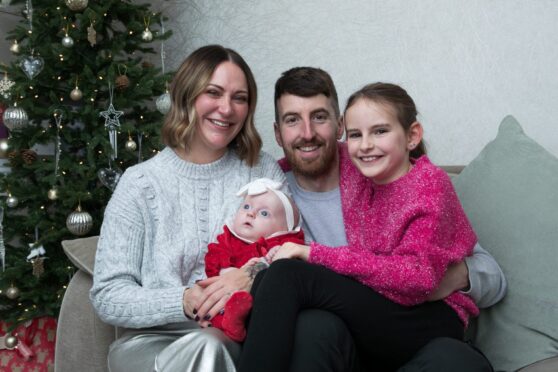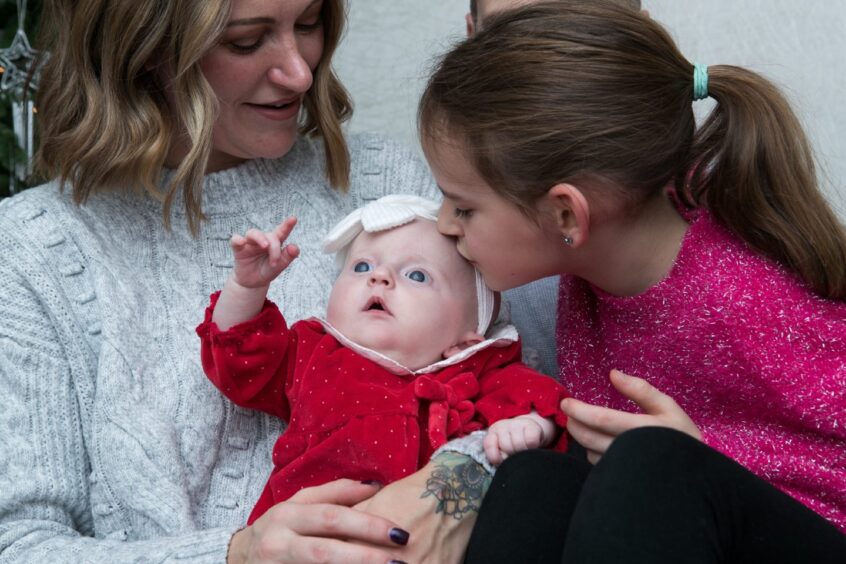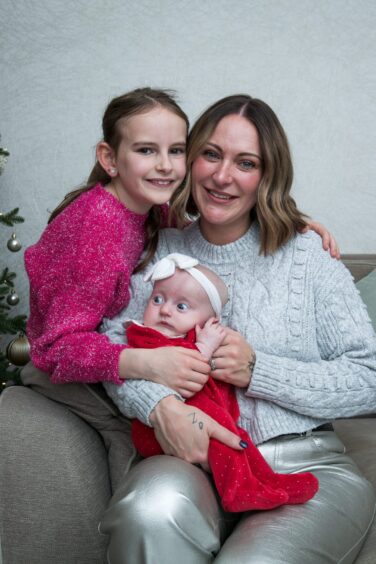
A hospital patient advisor is celebrating a wonderful Christmas with her second baby after beating cancer.
Danielle Greenan, 36, from Winchburgh, West Lothian, had bladder cancer diagnosed by chance during a pregnancy ultrasound with her first daughter, Zara, nine years ago.
“It will be a wonderful Christmas with plenty to celebrate,” she said yesterday.
“Our first daughter, Zara, nine, is overjoyed to have her baby sister, Remi, for Christmas.
“It is her first one as a big sister and she is already fussing over her, playing mum at every possible opportunity.
“I don’t think we could have wished for more at a very special time of year.
“We have come through a lot as a family with my treatment and the follow-up monitoring hoping for a continued clear scan at every check-up.
“All credit must go to both our families for their continuing support.”
Danielle’s diagnosis
Danielle says her chance diagnosis when she was pregnant with Zara came as a shock.
The tumours were picked up in a routine ultrasound which then triggered a referral for further investigation.
“The antenatal scan detected some irregularities in my bladder and, of course, I was worried.
“Being a patient advisor at an Edinburgh hospital, I knew immediately that it was serious when I got a referral letter to a bladder cancer specialist whom I knew through my work.
“A biopsy carried out with a cystoscopy, which goes into and examines the bladder, revealed an aggressive cancer which was fortunately at an early stage and could be removed.”
She fears that if she had not been pregnant the cancer would have been diagnosed at a much more advanced and harder to treat stage.
Repeated infections had been thought to be urinary tract infections which are the most common bacterial disease in pregnancy.
It was a worrying pregnancy with Zara, and it left her with a fear of having another baby.
“Doctors assured Scott and me that the bladder cancer was not caused by anything connected with pregnancy.
“While the cancer had been removed and I was getting regular check-ups for any sign of its return, I was still worried about having another child.”
After some soul searching, the couple decided to try for another baby and were blessed with a second healthy girl.
“It’s a perfect ending to a very worrying time in our lives. I know through personal experience and my job as a health professional how cancer can make people feel anxious and uncertain.
“We are incredibly happy to get the second chance to complete our family.”
Campaign for early diagnosis
Now she is campaigning for early diagnosis of a cancer which gives poorer chances of survival.
She believes that the disease can be dismissed as urinary tract infections and, consequently, treated with antibiotics instead of being referred for investigation by hospital urology teams.
She speaks as public Health Scotland reported last month that only six of the bladder cancer targets were met in April 2022 to March 2023, while 15 were not.
Some health professionals argue that the bar is being set too high for targets.
Evidence by government health authorities bears that out, with the shocking revelation that women have an increased chance of being diagnosed with the most advanced stage of bladder cancer (30% higher than men) and are also more likely to present as an emergency medical patient.
This comes as charity Fight Bladder Cancer says that Scotland has among the poorest survival rates for women and men in Europe.
Patient survivor and campaigner Dorothy Markham said: “The disease is more common in men but it can often have a worse outcome for women because diagnosis can be delayed if it is mistaken for recurrent bladder infections.
“Having blood in your wee needs hospital investigation.
“A referral for hospital investigation is also reasonable after two bladder infections.
“While it is more likely to be found in older people, it does occur in younger ones.
“Awareness and earlier treatment is improving, but it is not happening quickly enough.”
Public Health Scotland said: “All three regional cancer networks found several of the targets very challenging.
“In some cases, the availability of operating theatres and staff impacted on performance.”
It added that some targets were ambitious.
It conceded there is room for improvement and steps have been identified to achieve more including additional training for doctors and nurses and better awareness of best practice.
“The networks have commented that some targets were ambitious, and some should be adjusted as to how they are measured, that the current measures do not always take account of all the patients who should be excluded,” it added.

Enjoy the convenience of having The Sunday Post delivered as a digital ePaper straight to your smartphone, tablet or computer.
Subscribe for only £5.49 a month and enjoy all the benefits of the printed paper as a digital replica.
Subscribe © Andrew Cawley
© Andrew Cawley © Andrew Cawley
© Andrew Cawley